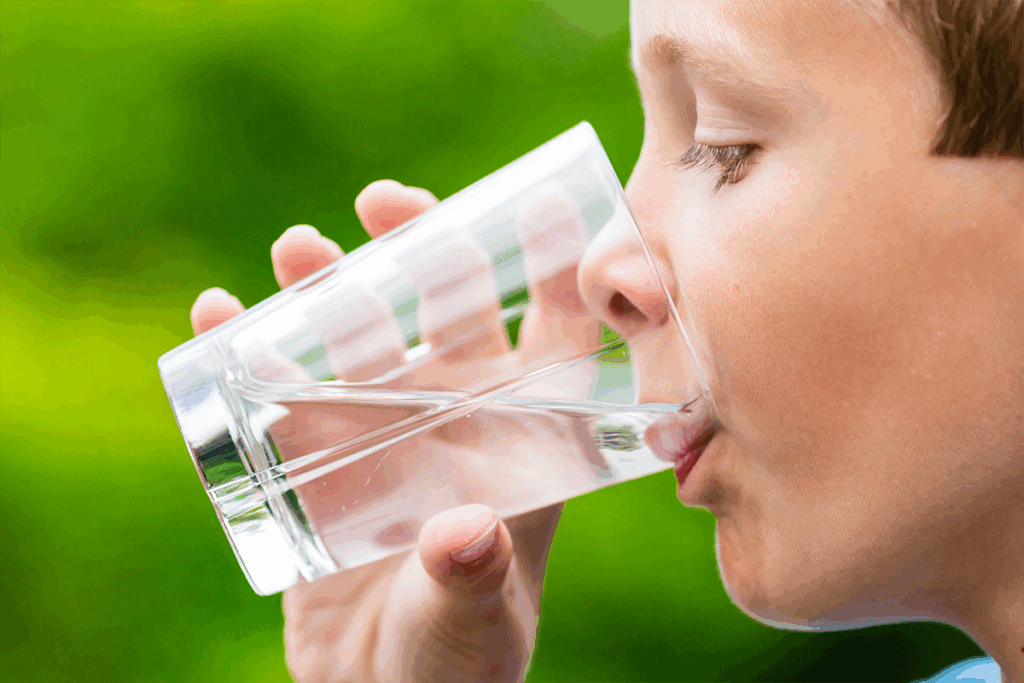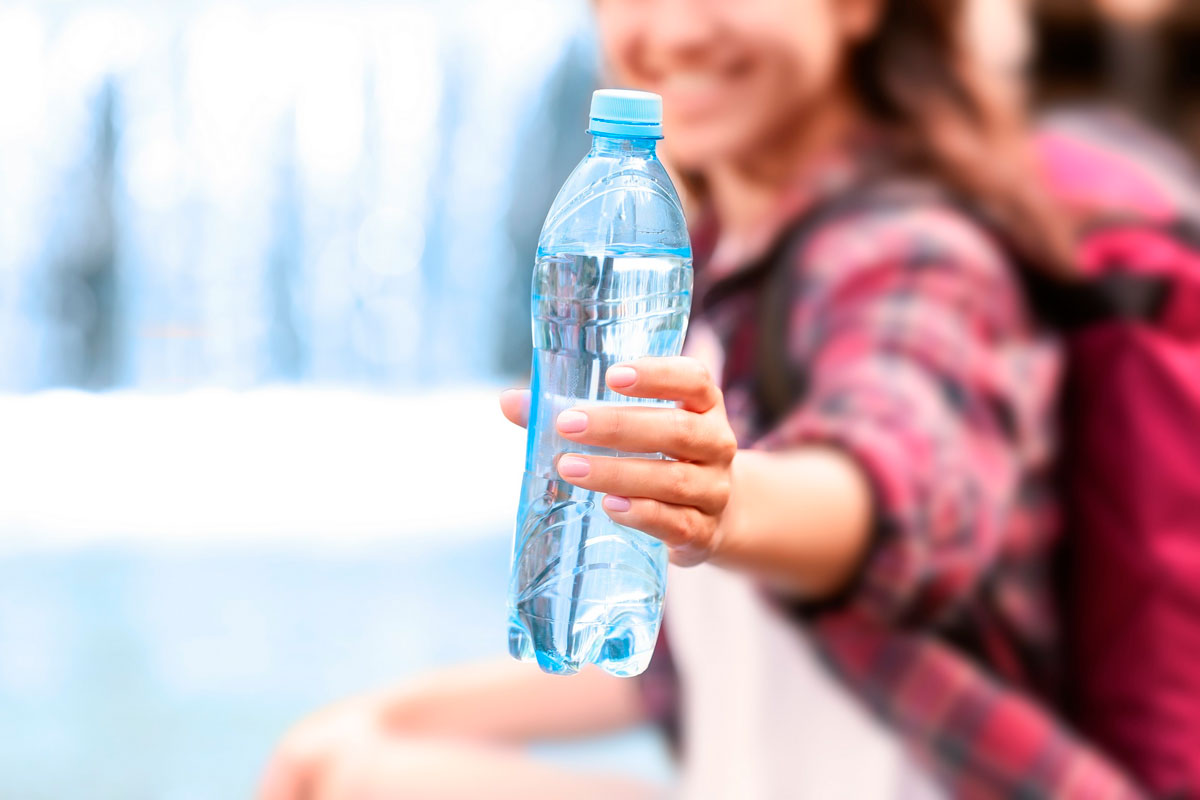Drinking enough water is key to kids’ health, growth, and brain function. But many kids don’t get enough water each day. We’ll look at how much water kids should drink and what affects their needs.

The American Academy of Pediatrics says kids aged 1–3 should have about 4 cups of fluids daily. This includes water and milk. As kids get older, their water needs change. Parents often wonder, “how much water should I drink a day” or how much their children need. The answer depends on age, gender, activity level, and climate. Knowing these needs helps support their growth and health.
Kids need to drink enough water. This helps keep their joints, bones, and teeth healthy. It also helps them perform better physically and mentally.
Key Takeaways
- Children’s daily water needs vary by age, gender, activity level, and environment. Parents often ask, “how much water should I drink a day?” — the answer depends on these factors.
- The American Academy of Pediatrics recommends about 4 cups of fluids per day for children aged 1–3 years.
- Proper hydration supports kids’ physical and mental development, helping them stay active and focused.
- As children grow and become more active, their hydration needs change — so revisiting how much water should I drink a day is important for every stage.
- Ensuring adequate water intake is vital for maintaining healthy joints, bones, and teeth.
The Importance of Proper Hydration for Children
Water is key for kids’ health. It helps their bodies work right and keeps them feeling good. Drinking enough water stops dehydration, which is bad for their health.
Essential Functions of Water in a Child’s Body
Water does many important things for kids, like:
- Keeping their body temperature stable
- Moving nutrients and oxygen to their cells
- Getting rid of waste
- Helping their skin, muscles, and joints stay healthy
- Making digestion better and preventing constipation
Studies say kids aged 4-8 need about 1.7 litres (around 7 cups) of water daily. Drinking enough water helps them feel better, think clearly, and focus better.

Signs and Consequences of Dehydration in Kids
Dehydration happens when kids lose more water than they take in. It can make them feel really bad. Signs include:
- Fewer wet diapers in babies
- Dry lips and mouth
- Dark-colored urine
- Feeling tired or cranky
- Feeling dizzy or lightheaded
It’s very important to catch dehydration early to avoid serious problems. Making sure kids drink water all day helps stop dehydration and its bad effects.
Knowing how important water is and spotting dehydration signs helps us keep our kids healthy and well-hydrated.
How Much Water Should Kids Drink a Day: Age-Based Guidelines
The amount of water kids need daily changes with age. It’s key for parents and caregivers to know these changes. This helps keep kids well-hydrated as they grow.

Water Needs for Toddlers and Preschoolers (Ages 1-3)
For kids aged 1-3, the American Academy of Pediatrics suggests introducing water at 6 months. Start with small amounts. They need 4-6 cups (32-48 ounces) of fluids daily, including water, milk, and other drinks.
Recommended Water Intake for Children Ages 4-8
Kids aged 4-8 need more water because they are more active and bigger. They should drink 5-7 cups (40-56 ounces) of fluids every day.
Water Requirements for Pre-teens (Ages 9-13)
Pre-teens (ages 9-13) have different water needs. Girls need about 2.1 litres (9 cups) of water daily. Boys need around 2.4 litres (10 cups). Teaching them to stay hydrated is important for their growth.
Understanding the Gap: Why Most Children Don’t Meet Guidelines
Many kids don’t drink enough water, despite guidelines. Busy lives, a love for sugary drinks, and not knowing how much water they need are reasons. Parents and caregivers can help by making sure kids drink enough water all day.
Sources of Hydration in Children’s Diets
Hydration is key for kids’ health, and it’s not just about drinking water. Other drinks and foods also help meet their hydration needs.
Drinking Water as the Primary Source
Drinking water is the simplest way to keep kids hydrated. Studies show that most of our water comes from drinking it. We should encourage kids to drink water often, like during and after playing.
Other Beverages That Contribute to Hydration
Other drinks can also help with hydration. Milk and 100% fruit juice are good examples. But, it’s important to watch how much juice kids drink because of its sugar.
- Milk gives hydration and important nutrients like calcium and vitamin D.
- 100% fruit juice, in small amounts, can help with hydration. But choose juices without added sugars.
Water-Rich Foods That Help Meet Daily Needs
Water-rich foods also play a big role in hydration. Foods like watermelon and cucumbers are full of water. They can be a tasty way to meet daily hydration needs.
Examples of Water-Rich Foods:
- Watermelon
- Cucumbers
- Strawberries
- Tomatoes
Adding these foods to their diet helps kids stay hydrated. It also gives them important vitamins and minerals.
5 Factors That Affect Your Child’s Water Requirements
It’s important to know what affects how much water a child needs. Drinking enough water is key to their health. But the amount can change a lot based on different factors.
Physical Activity Level and Sports Participation
Kids who are active or play sports lose more water. Make sure they drink water before, during, and after playing to avoid dehydration.
Climate, Weather, and Environmental Conditions
Hot weather and high humidity make kids need more water. Children in or visiting hot places will need more fluids to stay hydrated.
Health Status and Special Medical Considerations
Some health issues, like diabetes or kidney disease, can change a child’s water needs. Children with these conditions might need a special hydration plan.
Diet Composition and Sodium Intake
A child’s diet affects their water needs. High-sodium diets mean they need more water. It’s important to eat a balanced diet.
Other Factors Influencing Hydration Needs
Other things, like what they wear and their overall health, also matter. Wearing heavy or dark clothes can make them lose more water.
By thinking about these factors, parents can make a hydration plan that fits their child’s needs. This ensures they stay hydrated in different situations.
- Watch your child’s activity level and adjust their water intake.
- Think about the climate and weather.
- Consider your child’s health and any special needs.
- Keep their diet balanced and watch their sodium intake.
- Adjust their hydration plan based on other factors.
Conclusion: Practical Strategies to Keep Your Child Properly Hydrated
To help kids stay hydrated, parents can try a few things. Making water fun by adding fruits or using cool water bottles can make a big difference. For example, kids should aim for 8-10 cups (64-80 ounces) of water each day. This amount can change based on their age and how active they are.
Checking the colour of their urine is a simple way to see if they’re drinking enough water. If it’s pale yellow or clear, they’re probably getting enough. It’s also important to know when babies can start drinking water. Usually, around 6 months, babies can have a little water, along with their breast milk or formula.
By using these tips, parents can teach their kids good habits for drinking water. Places like LivHospital offer top-notch health advice. They help parents make the best choices for their child’s health.
FAQ’s:
How much water should my child drink daily?
The water your child needs depends on their age, sex, and how active they are. We suggest 8-10 cups (64-80 ounces) of water a day. But it can change based on the weather, how much they move, and their health.
What are the signs of dehydration in children?
Dehydration signs in kids include dry mouth and dark urine. They might also feel tired, dizzy, and have a fast heartbeat and breathing. If you think your child is dehydrated, get them to drink water and see a doctor if it doesn’t get better.
How can I make water more appealing to my child?
Add lemon, lime, or cucumber slices to their water. A fun or colourful water bottle can also help. Make sure water is easy to get and drink it yourself to set a good example.
Can other beverages and foods contribute to my child’s daily hydration needs?
Yes, milk, 100% fruit juice, and water-rich foods like watermelon and celery help too. But always make plain water the main source of hydration.
How does physical activity affect my child’s hydration needs?
Exercise makes kids lose water through sweat. They should drink water before, during, and after to stay hydrated. The amount needed depends on how hard and long they exercise.
At what age can children start drinking water?
Kids can start drinking water at 6 months, when they start eating solids. The amount needed changes with age, weight, and activity level. For babies under 6 months, breast milk or formula is enough.
How can I monitor my child’s hydration status?
Check the colour of their urine, which should be pale yellow or clear. Look for signs of dehydration like dry mouth or dizziness. Encourage them to drink water often during the day.
Are there any health conditions that affect a child’s hydration needs?
Yes, conditions like diabetes or kidney disease can change hydration needs. If your child has a health issue, talk to their doctor to find the right hydration plan.
How many glasses of water should my child drink per day?
The number of glasses depends on their age, sex, and activity level. Generally, kids should drink 8-10 cups (64-80 ounces) of water daily.
References
- American Academy of Pediatric Dentistry, American Academy of Pediatrics, & American Heart Association. (2025). Top health experts release new drink recommendations for kids and teens. https://www.aapd.org/about/about-aapd/news-room/new-drink-recommendations-for–kids-and-teens/
- American Academy of Pediatrics. (2024, July 25). Choose water for healthy hydration. https://www.healthychildren.org/English/healthy-living/nutrition/Pages/Choose-Water-for-Healthy-Hydration.aspx



































